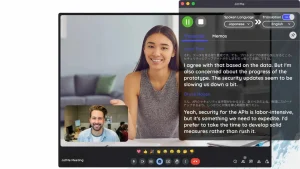If you manage multilingual meetings, professional remote support is the difference between hoping for smooth delivery and engineering it. In the first moments of any event, professional remote support steadies the audio, keeps language channels aligned, and shields speakers from tech drift. As sessions scale across rooms and time zones, professional remote support becomes the quiet layer that watches the entire system so audiences hear, read, and act without friction. At TransLinguist, that layer sits alongside Remote Simultaneous Interpreting, Speech AI, and Live Captions to give planners a single, dependable operating rhythm.
What professional remote support actually covers
Before the event
TransLinguist engineers run environment checks, confirm interpreter consoles, test mics and routing, and preload glossaries and channel maps. They brief interpreters and moderators on hand signals, pace, and handover etiquette so turn turn-taking is painless. This anticipatory work is what prevents last-minute scrambles.
During the event
Specialists monitor every stream in real time, track interpreter stamina, and keep caption cadence readable. If a browser stalls or a network dips, they guide a fast recovery path and maintain continuity on the language channels so the room stays in sync.
After the event
Teams consolidate incident notes, timing marks, and improvement points. Editors align names and terminology in the transcript and subtitle files so the replay library is clear and searchable. That post-work turns a live moment into an asset that continues to earn value.
Why remote support is not the same as basic help
Proactive monitoring beats reactive troubleshooting
Basic help desks wait for someone to shout. Professional support watches audio levels, interpreter talk time, channel occupancy, and caption latency, then intervenes before users notice a wobble. This is event assurance, not break-fix.
Recovery paths are rehearsed
When issues do occur, the team follows a clear sequence to restore service quickly and quietly, including fallback devices and mobile app contingency. The goal is continuity in the audience experience, not a heroic rescue on stage.
People plus playbooks
The craft sits with humans who know conferences, court-adjacent sessions, and public briefings. They carry domain awareness and teach speakers the small habits that keep meaning intact at speed.
How TransLinguist blends people and technology
Human expertise where nuance decides outcomes
Certified interpreters handle register, idiom, and culture across legal, medical, enterprise, and public sector work. Remote supervisors coach handovers, manage rotation, and adjust gain so delivery stays steady through long agendas.
Speech AI and captions that extend reach
Real-time recognition feeds captions and translated overlays for viewers who learn best by reading. Editors then tidy punctuation and speaker tags, creating subtitles that support on-demand study without extra travel or reshoots.
Control from one place
With TransLinguist Interactive, hosts open language channels, cue captions, chat with interpreters, and view quality signals from a single control surface. The aim is calm production, even when the schedule is packed.
Risk, privacy, and measurable outcomes
Privacy by design
Programs that touch patient data, contracts, or regulatory content require authenticated access, encrypted transport, and sensitive retention. TransLinguist configures sessions with documented handoffs so audits are predictable.
Metrics leaders can use
Track language channel selection, attendance, watch time, and questions asked. Compare completion before and after adding captions and clean replays. Use these numbers to expand coverage where it changes outcomes.
When automation is not enough
For consent language, safety instructions, or deposition excerpts, professional linguists remain in the loop. Automation gives pace. People protect intent.
A rollout plan that starts small and scales
Begin with one flagship meeting
Choose a high-visibility session. Enable interpreting, captions, and professional remote support. Publish subtitles within a day. Compare repeats, follow-up tickets, and satisfaction against the previous cycle. When the signals improve, move the setup to your next journey.
Make the habits easy to follow
Keep a one-page run of the show. List mic discipline, slide readability rules, and interpreter pre-brief notes. Maintain a living glossary so brand names, clinical terms, and legal phrases land the same way every time.
Close the loop with training
Short rehearsals for speakers and moderators reduce filler words, improve pacing, and keep caption lines clean. That polish shows up in every recording you publish.
Conclusion
When language access depends on luck, outcomes wobble. When it relies on professional remote support, events feel calm, decisions are made the first time, and replays stand up to scrutiny. TransLinguist builds that calm into your schedule with expert people, disciplined playbooks, and technology that respects context. If you are ready to move beyond basic interpretation services and run multilingual programs like clockwork, we are prepared to help. Start Your Translation Project Today and make professional remote support your new baseline for every meeting and every broadcast. With professional remote support in place, your teams focus on the message while we guard the delivery.
FAQs
How is professional remote support different from a basic help desk?
A help desk waits for tickets. Professional remote support watches audio levels, channel health, interpreter rotation, and caption cadence continuously. The team acts proactively and follows rehearsed playbooks to keep delivery steady through complex agendas.
Do we still need interpreters if we use automation?
Yes. Automation gives speed and reach, while interpreters carry nuance, register, and legal or clinical intent. The most reliable setups blend both, so sensitive exchanges are handled by people and fast moments are assisted by technology.
How does professional remote support improve accessibility?
The team keeps captions readable, ensures language channels are easy to select, and verifies that replays include accurate subtitles. This helps Deaf and hard-of-hearing viewers, non native speakers, and people who prefer to read while they listen.
What should we measure to prove value?
Track language channel selection, attendance, watch time, and repeat questions. Many planners also log reductions in follow-up tickets after captions and subtitles are posted. When these signals rise, professional remote support has done its job.



